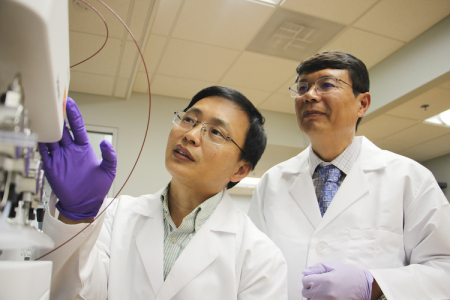An anticancer drug developed by researchers from the University of Florida College of Pharmacy has become the first drug of its kind allowed to proceed to clinical trial by the U.S. Food and Drug Administration.

The drug, DT2216, targets leukemia, lymphoma, and breast and lung cancers. The researchers expect it will available for patients, in a clinical trial setting, in April or May this year. The phase 1 study will take place primarily at the UT Health San Antonio MD Anderson Cancer Center.
The drug acts on a protein called B-cell lymphoma-extra large, or BCL-XL, which fuels the growth of malignant cells and strengthens their resistance to therapy. UF researchers developed the new drug using a technology that relies on PROTACs, small molecules that, instead of just suppressing cancer-promoting proteins, help cells break them down.
The FDA’s clearance makes this the first PROTAC drug generated by an academic lab, as well as the first BCL-XL-targeted PROTAC, to go to clinical trial.
“We started a great journey about six years ago to develop safer and more effective therapeutics for cancer, and we hope cancer patients can eventually benefit from our research,” said Daohong Zhou, M.D., a professor of pharmacodynamics in the UF College of Pharmacy and the Henry E. Innes Professor of Cancer Research at the UF Health Cancer Center. Zhou also serves as the UF Health Cancer Center’s associate director for translation and drug development.
The researchers demonstrated in a variety of models that DT2216 suppressed the growth of different types of tumors — including T-cell acute lymphoblastic leukemia, T-cell lymphoma and drug-resistant breast and small cell lung cancers — on its own and in combination with other drugs.
“I feel incredibly proud of what we’ve achieved as a team of postdocs, students and lab technicians working on this project,” said Guangrong Zheng, Ph.D., an associate professor of medicinal chemistry in the UF College of Pharmacy, who jointly directed the research alongside Zhou.
Zheng said the team has already begun working on the next generation of PROTACs that can target BCL-XL and BCL-2, another protein that cancer cells depend on. “We hope these drugs will have broader applications in cancer therapy.”
The study was supported by a multidisciplinary research team from UF, the University of Texas M.D. Anderson Cancer Center, the Dana-Farber Cancer Institute and Harvard Medical School, Columbia University, Children’s Hospital Los Angeles, and the University of Texas at San Antonio. The team brought together diverse research expertise in cellular and molecular biology, drug discovery and development, medicinal chemistry, hematology and bioinformatics.
Along with Zhou and Zheng, other UF College of Pharmacy researchers include Sajid Khan, Ph.D.; Xuan Zhang, Ph.D.; Dongwen Lyu, Ph.D.; Yonghan He, M.D., Ph.D.; Peiyi Zhang, Xingui Liu, Ph.D.; Dinesh Thummuri, Ph.D.; Yaxia Yuan, Ph.D.; Janet S. Wiegand, Jing Pei, Abhisheak Sharma, Ph.D.; Christopher R. McCurdy, Ph.D.; and Yuma T. Ortiz. Researchers from the UF College of Medicine include Weizhou Zhang, Ph.D.; Ryan Kolb, Ph.D.; Umasankar De, Ph.D.; Weizhou Zhang, Ph.D. and Vivekananda Budamagunta.

